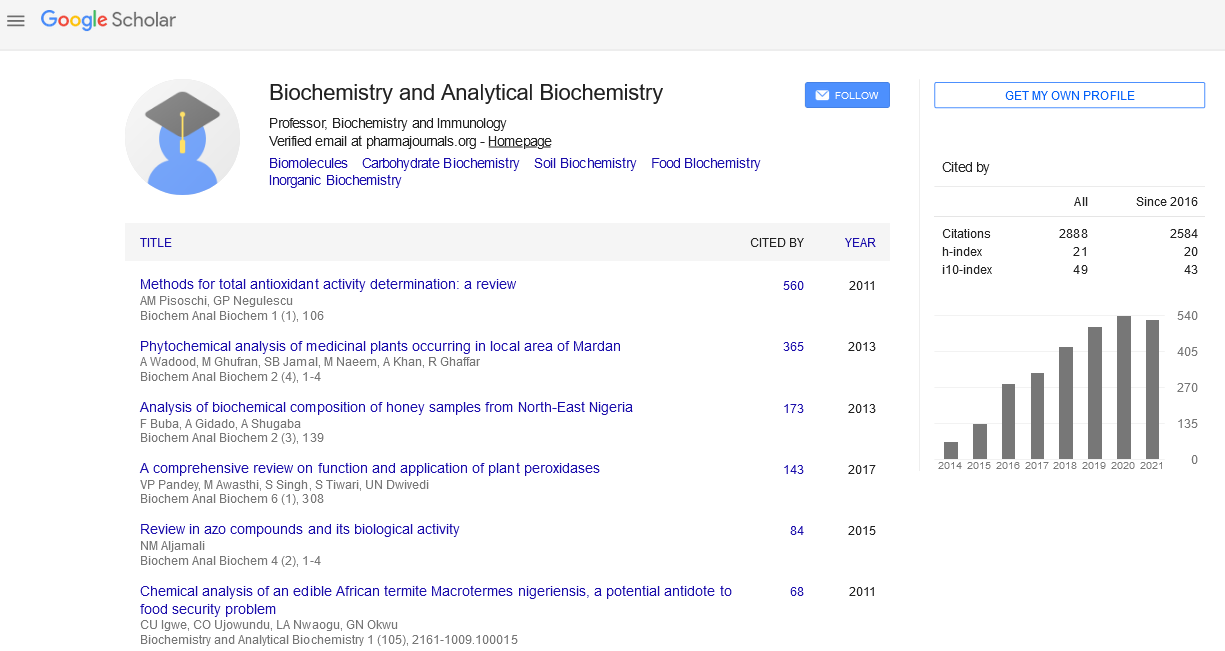Indexed In
- Open J Gate
- Genamics JournalSeek
- ResearchBible
- RefSeek
- Directory of Research Journal Indexing (DRJI)
- Hamdard University
- EBSCO A-Z
- OCLC- WorldCat
- Scholarsteer
- Publons
- MIAR
- Euro Pub
- Google Scholar
Useful Links
Share This Page
Journal Flyer

Open Access Journals
- Agri and Aquaculture
- Biochemistry
- Bioinformatics & Systems Biology
- Business & Management
- Chemistry
- Clinical Sciences
- Engineering
- Food & Nutrition
- General Science
- Genetics & Molecular Biology
- Immunology & Microbiology
- Medical Sciences
- Neuroscience & Psychology
- Nursing & Health Care
- Pharmaceutical Sciences
Abstract
Protective Effect of Soy Isoflavones (from Glycine max) on Adipose Tissue Oxidative Stress and Inflammatory Response in an Experimental Model of Post-menopausal Obesity: The Molecular Mechanisms
Sankar Panneerselvam, Rajaa Muthu Packirisamy, Zachariah Bobby and Magadi Gopalakrishna Sridhar
Obesity, adiposity mediated oxidative stress and inflammatory response has been identified to have an etiological origin for most of the complications associated with ageing populace. However, there are limited studies addressing the metabolic role of adipose tissue in the pathobiology of postmenopausal complications with respect to oxidative stress and inflammation. Numerous studies have reported the beneficial effects of soy isoflavones on postmenopausal complications; however, its efficacy these complications in postmenopausal model of obesity remain unclear. In the present study we found that the both ovariectomy and high fat diet (30 per cent fat) in isolation and in combination developed adipose tissue oxidative stress as evidenced by the reduced level of total antioxidant status (TAS) in association with elevated levels of adipose tissue malondialdehyde (MDA) and MDA/TAS ratio. These rats also displayed with inflammation as showed by increased levels of plasma tumor necrosis factor alpha (TNFα) and high sensitive C – reactive protein (hsCRP). The expression of adipose tissue inflammatory proteins; cyclo-oxygenase 2 (COX2), monocyte chemo attractant protein (MCP1) and protein kinase C alpha (PKCα) were heightened in response to both ovariectomy and high fat diet. All these metabolic changes were further augmented when ovariectomy was followed by high fat diet. This suggests that there was a synergism between the postmenopausal state and intake of fat rich diet in the development of adipose tissue oxidative stress and inflammatory response. Treatment with soy isoflavones significantly inhibited these metabolic changes improved adipose tissue oxidative stress and inflammatory response suggesting the use of this natural phytoestrogen as an anti-oxidant and anti-inflammatory agent for relieving metabolic consequences associated with postmenopausal women.


